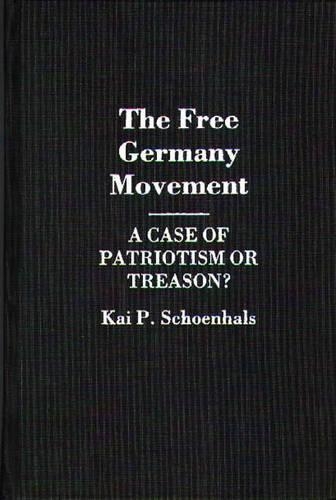
The Free Germany Movement: A Case of Patriotism or Treason
(Hardback)
Publishing Details
The Free Germany Movement: A Case of Patriotism or Treason
By (Author) Kai Schoenhals
Bloomsbury Publishing PLC
Praeger Publishers Inc
10th March 1989
United States
Classifications
Tertiary Education
Non Fiction
940.5343
Physical Properties
Hardback
176
Description
Although much has been written on the failed attempt of German officers and conservative politicians to overthrow Hitler during World War II, the German leftist movement dedicated to the same goal has received little attention in the West. This book is the first fully documented account of the National Committee Free Germany (NKFD), an organization of German prisoners of war and Communist exiles who in 1943 established an antifascist movement on Soviet soil to overthrow Hitler. Based on extensive interviews with surviving members of the organization and a thorough examination of East German archives, this study presents a wealth of information on the subject that has not until now been available outside the Communist bloc. Tracing the origins of the German antifascist movement of the 1930s, Schoenhals discusses the creation of the National Committee Free Germany and the League of German Officers and describes the wartime activities of the groups. Although the NKFD officially disbanded at the end of the war, the participation of its former members intensified when some of them were repatriated to Soviet-occupied Germany in 1945. The author assesses the influence of the Free Germany movement leaders on developments in the Soviet Zone of Occupation (1945-1949) and the GDR after October 1949. Playing a central role in the construction of the new socialist state, veterans of the National Committee were instrumental in establishing both the National People's Army and the National Democratic Party of Germany. The author comments on the bitter postwar reactions of West Germans to this group, who were considered outright traitors or at best dupes of the Communists. With its rich documentation and balanced analysis, this work is a significant contribution to the literature of World War II and a valuable resource for students or researchers working in either political science or history.
Reviews
Schoenhals (Kenyon College) provides a thorough treatment of the National Committee Free Germany' (NKFD), an organization of German prisoners of war and Communist exiles who, beginning in 1943, established an anti-Nazi movement in the Soviet Union. The NFKD never successfully promulgated anti-Hitler propaganda in Germany, but the organization did achieve modest success in the de-Nazification of German prisoners of war in the Soviet Union. All of the NKFD's members were condemned by the Nazi regime, and, as Schoenhals relates, most were labeled as Communist traitors' in postwar Germany. Based largely on East German sources and interviews with NKFD veterans in East Germany, this balanced account should serve as a valuable source for advanced undergraduates and graduate students in the military history of WW II. An extensive bibliography of secondary sources on the German army's anti-Nazi elements is included.-Choice
"Schoenhals (Kenyon College) provides a thorough treatment of the National Committee Free Germany' (NKFD), an organization of German prisoners of war and Communist exiles who, beginning in 1943, established an anti-Nazi movement in the Soviet Union. The NFKD never successfully promulgated anti-Hitler propaganda in Germany, but the organization did achieve modest success in the de-Nazification of German prisoners of war in the Soviet Union. All of the NKFD's members were condemned by the Nazi regime, and, as Schoenhals relates, most were labeled as Communist traitors' in postwar Germany. Based largely on East German sources and interviews with NKFD veterans in East Germany, this balanced account should serve as a valuable source for advanced undergraduates and graduate students in the military history of WW II. An extensive bibliography of secondary sources on the German army's anti-Nazi elements is included."-Choice
Author Bio
KAI P. SCHOENHALS is Associate Professor of History at Kenyon College. He is the author of Revolution and Intervention in Grenada and has contributed chapters and journal articles on topics in history and political science.
